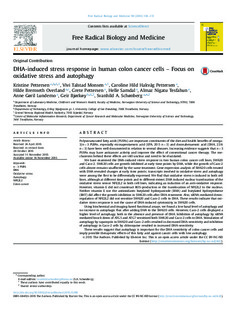| dc.contributor.author | Pettersen, Kristine | |
| dc.contributor.author | Monsen, Vivi Anita Talstad | |
| dc.contributor.author | Pettersen, Caroline Hild | |
| dc.contributor.author | Overland, Hilde Bremseth | |
| dc.contributor.author | Pettersen, Grete Klippenvåg | |
| dc.contributor.author | Samdal, Helle | |
| dc.contributor.author | Tesfahun, Almaz Nigatu | |
| dc.contributor.author | Lundemo, Anne Gøril | |
| dc.contributor.author | Bjørkøy, Geir | |
| dc.contributor.author | Schønberg, Svanhild Margrethe Arentz | |
| dc.date.accessioned | 2017-06-21T12:03:51Z | |
| dc.date.available | 2017-06-21T12:03:51Z | |
| dc.date.created | 2015-11-26T10:31:54Z | |
| dc.date.issued | 2016 | |
| dc.identifier.citation | Free Radical Biology and Medicine. 2016, 90 158-172. | nb_NO |
| dc.identifier.issn | 0891-5849 | |
| dc.identifier.uri | http://hdl.handle.net/11250/2446583 | |
| dc.description.abstract | Polyunsaturated fatty acids (PUFAs) are important constituents of the diet and health benefits of omega-3/n−3 PUFAs, especially eicosapentaenoic acid (EPA, 20:5 n−3) and docosahexaenoic acid (DHA, 22:6 n−3) have been well documented in relation to several diseases. Increasing evidence suggests that n−3 PUFAs may have anticancer activity and improve the effect of conventional cancer therapy. The mechanisms behind these effects are still unclear and need to be elucidated.
We have examined the DHA-induced stress response in two human colon cancer cell lines, SW620 and Caco-2. SW620 cells are growth-inhibited at early time points by DHA, while the growth of Caco-2 cells almost remains unaffected by the same treatment. Gene expression analysis of SW620 cells treated with DHA revealed changes at early time points; transcripts involved in oxidative stress and autophagy were among the first to be differentially expressed. We find that oxidative stress is induced in both cell lines, although at different time points and to different extent. DHA induced nuclear translocation of the oxidative stress sensor NFE2L2 in both cell lines, indicating an induction of an anti-oxidative response. However, vitamin E did not counteract ROS-production or the translocation of NFE2L2 to the nucleus. Neither vitamin E nor the antioxidants butylated hydoxyanisole (BHA) and butylated hydoxytoluene (BHT) did affect the growth inhibition in SW620 cells after DHA-treatment. Also, siRNA-mediated down-regulation of NFE2L2 did not sensitize SW620 and Caco-2 cells to DHA. These results indicate that oxidative stress response is not the cause of DHA-induced cytotoxicity in SW620 cells.
Using biochemical and imaging based functional assays, we found a low basal level of autophagy and no increase in autophagic flux after adding DHA to the SW620 cells. However, Caco-2 cells displayed a higher level of autophagy, both in the absence and presence of DHA. Inhibition of autophagy by siRNA mediated knock down of ATG5 and ATG7 sensitized both SW620 and Caco-2 cells to DHA. Stimulation of autophagy by rapamycin in SW620 and Caco-2 cells resulted in decreased DHA-sensitivity and inhibition of autophagy in Caco-2 cells by chloroquine resulted in increased DHA-sensitivity.
These results suggest that autophagy is important for the DHA sensitivity of colon cancer cells and imply possible therapeutic effects of this fatty acid against cancer cells with low autophagy. | nb_NO |
| dc.language.iso | eng | nb_NO |
| dc.publisher | Elsevier | nb_NO |
| dc.rights | Attribution-NonCommercial-NoDerivatives 4.0 Internasjonal | * |
| dc.rights.uri | http://creativecommons.org/licenses/by-nc-nd/4.0/deed.no | * |
| dc.title | DHA-induced stress response in human colon cancer cells - Focus on oxidative stress and autophagy | nb_NO |
| dc.type | Journal article | nb_NO |
| dc.type | Peer reviewed | nb_NO |
| dc.description.version | publishedVersion | nb_NO |
| dc.source.pagenumber | 158-172 | nb_NO |
| dc.source.volume | 90 | nb_NO |
| dc.source.journal | Free Radical Biology & Medicine | nb_NO |
| dc.identifier.doi | 10.1016/j.freeradbiomed.2015.11.018 | |
| dc.identifier.cristin | 1293556 | |
| dc.relation.project | Norges forskningsråd: 223255 | nb_NO |
| dc.description.localcode | &2015 The Authors. Published by Elsevier Inc. This is an open access article under the CC BY-NC-ND license (http://creativecommons.org/licenses/by-nc-nd/4.0/ | nb_NO |
| cristin.unitcode | 194,65,15,30 | |
| cristin.unitcode | 194,65,10,0 | |
| cristin.unitcode | 194,68,20,0 | |
| cristin.unitname | Centre of Molecular Inflammation Research (SFF-CEMIR) | |
| cristin.unitname | Institutt for laboratoriemedisin, barne- og kvinnesykdommer | |
| cristin.unitname | Fakultet for teknologi | |
| cristin.ispublished | true | |
| cristin.fulltext | original | |
| cristin.qualitycode | 1 | |

